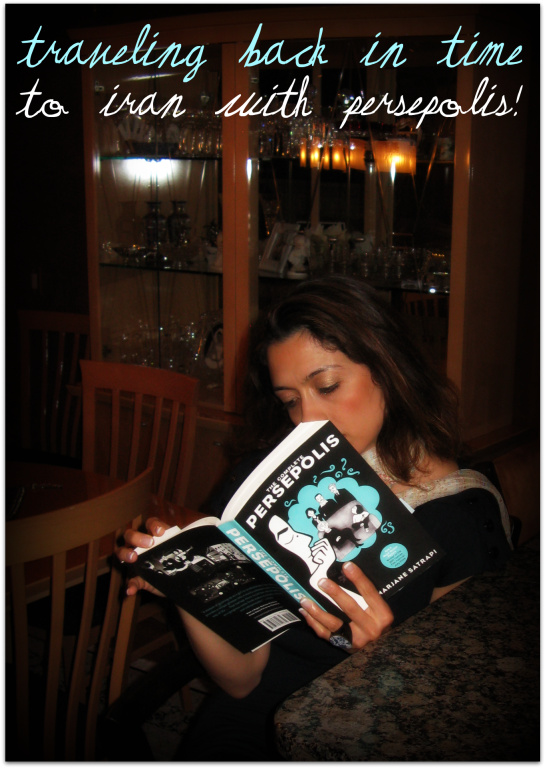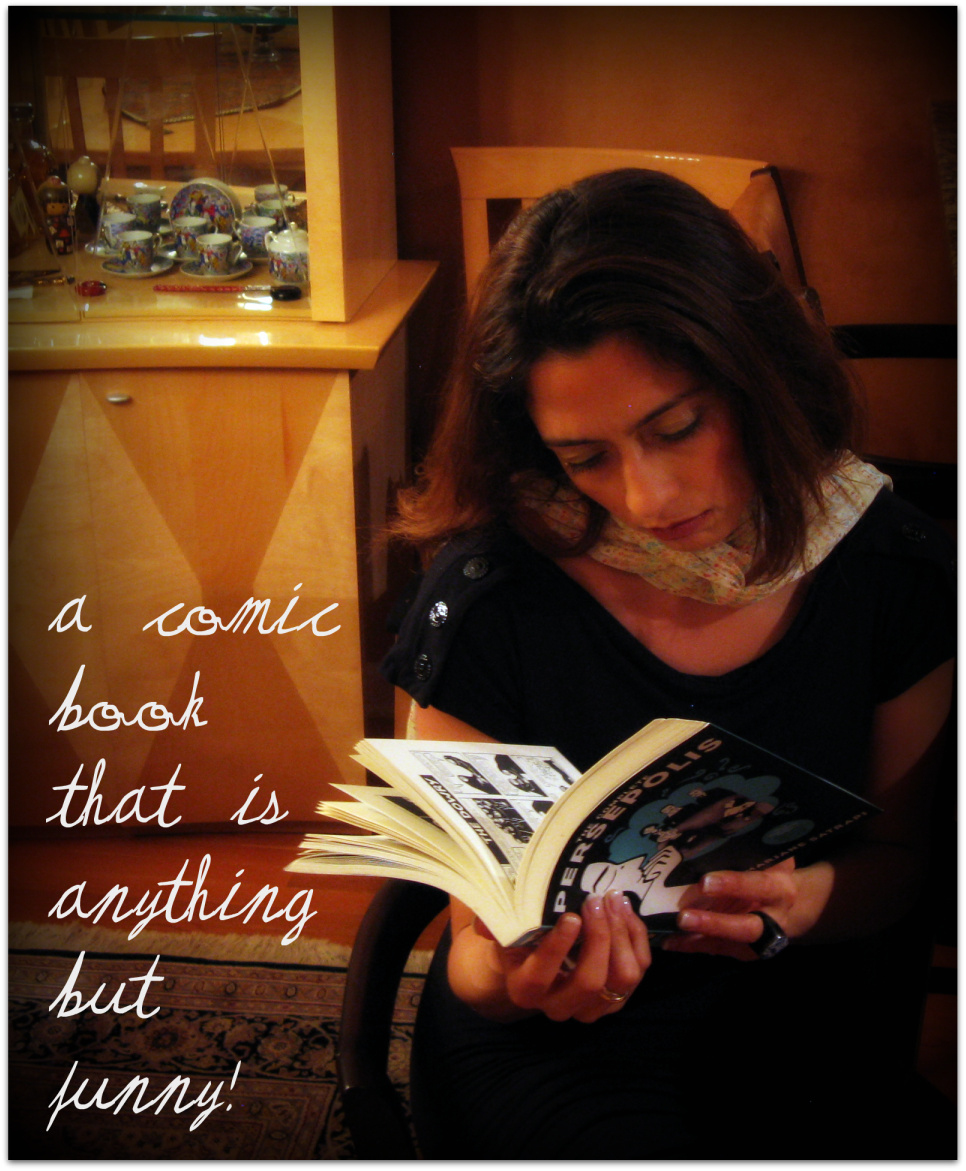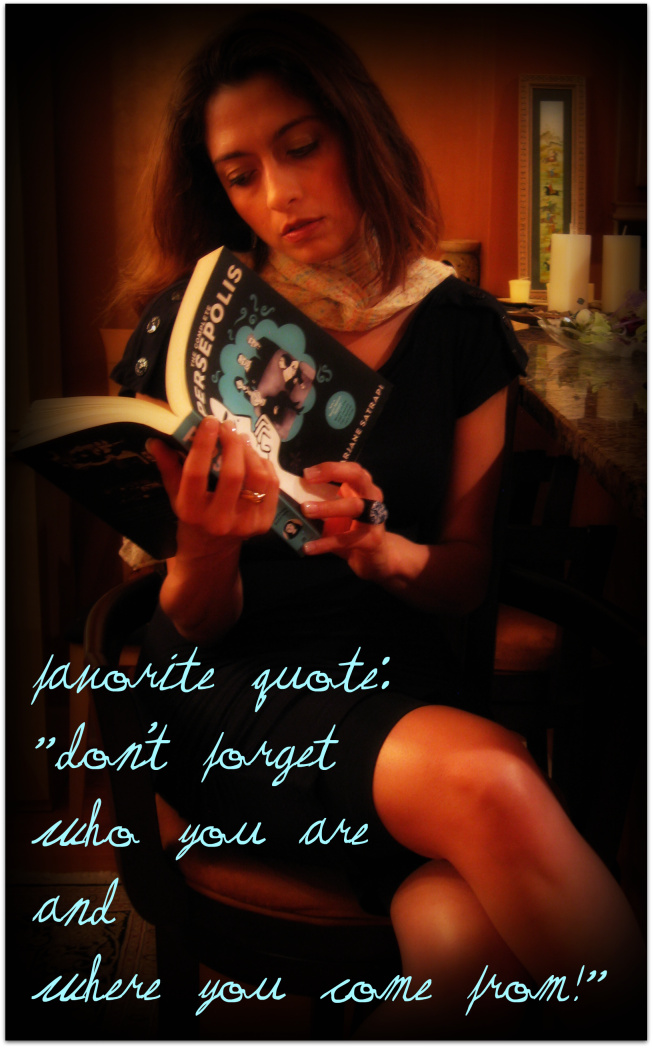 A picture. A few words in a book. A flashback. That is all it takes for our memories to be triggered from their dormant existence in the quiet corners of our mind. It can be nearly 30 years later and much may fade away in this life but some memories are pertinacious. No sooner had I opened the first page of Satrapi’s “Persepolis” that I remembered the first day returning home from school in Iran.
A picture. A few words in a book. A flashback. That is all it takes for our memories to be triggered from their dormant existence in the quiet corners of our mind. It can be nearly 30 years later and much may fade away in this life but some memories are pertinacious. No sooner had I opened the first page of Satrapi’s “Persepolis” that I remembered the first day returning home from school in Iran.
It was the early 1980s. I must have been in first grade. It was not a good time to be an Iranian or to live in the turmoil that was our beautiful Tehran. The 1979 revolution was in full swing, and the new regime had just recently mandated the girls’ “uniforms”: Girls as young as 7 years old must cover their hair (as well as the rest of their body except their little tiny hands so they can write and do their homework). The obsession of the Iranian revolution can sometimes be summed up in just that word, “women’s hair“, that “offensive”, “lustful”, “suggestive”, “provocative”, God-given part of our bodies, the hair on top of our heads, which we must hide lest we insult a man who casts eyes our way and then be doomed to hell for all eternity, but I shouldn’t digress. For my (all-girls) school, the particular mandated “hejab” (the act of covering or the actual covering material) was an especially repulsive looking one. I would describe it but words fail me in recalling the bitter details. My grandmother made mine in such a way so that my head could breathe and so that I wouldn’t be bald in a few years but I digress again! So I come home from school, and my mother, my sweet darling mom, in her utter frustration, pulls this “hejab” out of my head so harshly that my gold stud ear ring goes flying across the kitchen. My dad, my sweet darling Daddy, tries to calm her down while I pretend to go looking for my stupid ear ring.
The despair. The disgust. The speechless cruelties of the Iranian revolution are countless, but making me wear that “hejab” day in and day out was despicable. That is my most unforgettably raw memory of all, made all the more fresh and protruding with Marjane Satrapi‘s memoirs of growing up in post-revolution Iran.
I read Persepolis in under 6 hours; quite obviously I inhaled it first and digested afterward. Or still am digesting.

Satrapi tells her story using a comic book style. She introduces us to her little self growing up in Iran, her parents and their many struggles and disappointments, her grandmother and her strength, her uncles and their doomed fate, her friends and their varying destinies, and most of all, the products of the revolution and their infinite brutality. She achieves all of this in cartoon strips. She tells her tale brilliantly, poignantly, with simplistic style, honesty, and humor. Yes, there is much humor in this book, but I rarely laughed. I believe human being are conditioned to survive, and Iranians, who have had the lesser blessings as far as nations go, have mastered the art of laughing at their own misfortune!
Revolutions don’t happen overnight. The government regime may change so but the drastic act of taking a people’s freedom away, now that has to be done quite carefully and it can only be achieved by evil masterminds at this game. They, the masterminds, must know that to deny people all of their freedom overnight is, well, quite ridiculous, but to get them on board slowly and carefully, to strip them of all of their material and intangible possessions, one thin layer at a time, now that, they the people might just go for.
These adjustments should be imperceptible to even the most acute eye in order to be effective. The act of taking away one’s freedom must be served in small bitter pills – not large ones on which one might choke. They must seem “acceptable”, even in their utter senselessness. To the slow adjustments, people first disagree and fight but then slowly consent in their disbelief and shock and silence. Soon they the people find themselves saying (about the change), “Well, it’s not that bad! It could be worse!” and no sooner do they find themselves getting “used” to this new way of living that the government decides it is time for the next layer to come off. With this repeated process, the human condition can be deteriorated and the human dignity kicked around more than a few times, before one realizes the hell one finds oneself in, needless to say, far too late for any effective reversible action!
Reading is the best pastime for an active mind! If you like to see the other book reviews, check the index of In Print.
In her saga, Satrapi explains to us through her creative approach the effect of this revolution on her life. She takes us to her schools, where the modern education system is put on temporary hold while the religious fanatics figure out a way to teach their fanaticism to new generations of children and adolescents and where the new school rules and regulations are put in place, the context of which is ludicrous beyond words. She takes us to the new streets, once filled with laughter, fashionably dressed Iranian women, children running freely, boutiques selling goods, and people living a carefree life to streets filled with the machine-gun-strapped revolutionary guards arresting people and teenagers at their whim, and filling the void of everything before with nothing but fear and senselessness. She takes us to the prisons where her uncle spends his last days for having been a “traitor” and to hospitals where one too many young men are beyond injured or dying in vain from the Iran-Iraq 8-year war. And she takes us back to her home, where even in the depth of her family’s privacy, their peace is encroached upon and often disturbed.
The most interesting part of this story is Satrapi’s return to Iran after a brief stint in Europe. She finds herself quite miserable and lonely in Austria and returns home to Iran for a few years before leaving permanently for France. This is not an uncommon story. I have heard countless reports of Iranians leaving for a better life, and declaring it much too hard, they return to Iran. There is no place quite like home, no doubt, and the Iranian culture lends itself to all the eccentricities of a Middle Eastern culture: overflowing warmth, love, compassion, gossip, fashion, more gossip, hospitality, entertainment, friendliness and sociability. There is no place which embodies the Iranian spirit (Although Los Angles and its huge Iranian population at Irangeles come close!) and it is a difficult thing to leave behind. So many return after an attempt to set up home somewhere else; they give up everything to find that homey spirit again and in it, seek some semblance of happiness even in the face of all adversity.
In reflecting on this book, I admit that Satrapi’s tone of voice is much milder than mine would have been, had I been the story teller. She is also milder than Azar Nafisi’s “Reading Lolita in Tehran“. In both her writing and in the brilliant but painful-to-watch animated movie, I remember thinking how patient and accepting Satrapi appears to be. While she makes her points crystal clear using elements of irony and sarcasm and humor, she often refrains from belligerent attacks on the government or the regime. She implies it but does not explicitly state it. She is forever the dignified victim, the confused child, the restrained adolescent, the disillusioned and suicidal adult, and finally, the emerging young woman who, having failed at every attempt to make a life in Iran for herself, leaves it to find her destiny elsewhere.

Her saga hits home for every Iranian who has lived in Iran during these years. Her story is unique and universal at the same time. When she tells us to be true to our heritage, to “never forget where we come from“, she identifies with me and with every one else who has had to leave their home country behind to start over in a new place.
I read an incredibly unforgettable tale in “Persepolis”. I thank Marjane Satrapi for reaffirming my decision in writing my own memoirs of Iran now. I commend her for the tremendously creative approach in instilling those permanent pictures in my mind, pictures so irresistible that I start re-reading whenever I open any random page. Pictures so ideal when words come short in describing the atrocities of a government such as the one in Iran and the experience of innocent people such as hers and to a much lesser extent, mine.
 I am Farnoosh, the founder of Prolific Living. So glad you are here. My mission is to empower you to unblock your creative genius to live your dream life.
I am Farnoosh, the founder of Prolific Living. So glad you are here. My mission is to empower you to unblock your creative genius to live your dream life.